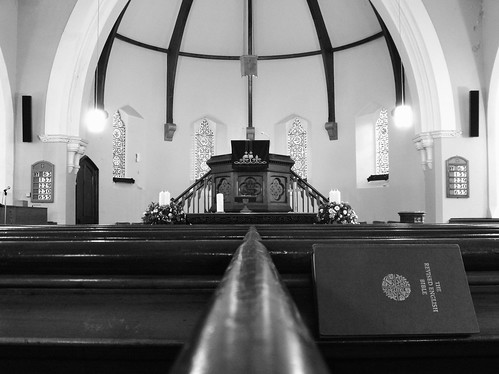Daily reflection and inspiration from the "Prince of Preachers," Charles Haddon Spurgeon.
Showing posts with label preaching. Show all posts
Showing posts with label preaching. Show all posts
Friday, September 26, 2014
Live Your Testimony, Give Your Testimony
I have so to speak on God’s behalf that those about me may see what religion is by watching my life. Whatever my lot, condition, or occupation, I have a witness to bear; for those who never read the Bible may read me, and those who never think of Christ may at least think of one of his disciples, and see in some degree what the Master is by what the servant is. Let this object tone and tune your lives, my brothers and sisters; and let the members of this church especially bear in mind that they are bound from morning to night in all that they are and all that they do to be speaking on the behalf of God.
But, further, we are bound to do this by giving instruction. All of you who have been taught should also teach, and I am sure there is a great want of instruction in this age: instruction, I mean, upon the things of God. We have probably more present need of instruction than of exhortation. We have many who exhort, but few who edify. Do, dear friends, whether you teach in the Sunday-school, or stand up at the corner of the street, or talk with friends and comrades, try to make known the name and nature and attributes of God; show his claims, the perfect righteousness demanded by his law, and the penalties due to disobedience; speak on God’s behalf of his gospel’s freeness, fullness, and sureness; speak on God’s behalf concerning the doctrine of his providence and the great truths of his grace and sovereignty. Do not let those around you die for lack of knowledge: make the name of the Lord to be known as much as lieth in you.
From a sermon by Charles Haddon Spurgeon entitled "God's Advocates Breaking Silence," delivered March 17, 1878. Image by Bob Jagendorf on Flickr under Creative Commons License.
Labels:
Christ,
Christianity,
Christians,
Evangelical,
evangelism,
God,
Jesus,
preaching,
religion,
Spurgeon,
testimony
Wednesday, September 25, 2013
The Sum of the Gospel
Beloved, because Jesus is the sum of the gospel he must be our constant theme. “God forbid that I should glory save in the cross of our Lord Jesus Christ.” “I determined not to know anything among you save Jesus Christ and him crucified.” So spake men of old, and so say we.
When we have done preaching Christ we had better have done preaching; when you have done teaching in your classes Jesus Christ himself, give up Sunday school work, for nothing else is worthy of your pains. Put out the sun, and light is gone, life is gone, all is gone. When Jesus is pushed into the background or left out of a minister’s teaching, the darkness is darkness that might be felt, and the people escape from it into gospel light as soon as they can. A sermon without Jesus in it is savourless, and worthless to God’s tried saints, and they soon seek other food. The more of Christ in our testimony the more of light and life and power to save.
From a sermon by Charles Haddon Spurgeon entitled "The Jesus Christ Himself," delivered December 9, 1877. Image by Ruben Sihombing on Flickr under Creative Commons License.
Friday, June 14, 2013
A People Who Know The Truth
In the present age if any man can talk well he will get a following, whatever he may teach. I am astounded at some professors, who can hear this man to-day and that man the next, though the two are diametrically opposed. Surely there is some difference between truth and error, and mere cleverness cannot neutralize false doctrine. Our forefathers discerned between things that differed, and when false doctrine came before them they cast it out, notwithstanding the eloquence of its advocate. I do not want you to be bigots. God deliver us from their bitter spirit, but I do want you to be sound believers. There is a great difference between obstinate bigotry and a decided maintenance of that which we have believed. After all, what is the chaff to the wheat? There is a difference between the doctrines of men and the teachings of the Lord. No lie is of the truth. Garnish it as you may, it is still a lie. Oh to be rooted and grounded and built up in Christ! One of the most desirable things in this fickle age is to see around the minister of Christ a people who know the truth, and feel that the truth binds them fast to their God.
From a sermon by Charles Haddon Spurgeon entitled "Taking Hold Upon God," delivered October 7, 1877. Image by Jeff Pang on Flickr under Creative Commons License.
Saturday, March 2, 2013
The Spirit At Work
We know that at certain times of the year we may expect winds, and if they come not to a day or two, yet, as a rule, the month is stormy; and there are also trade winds, monsoons which blow with remarkable regularity and are counted upon by mariners. And so with the Spirit of God. We know that at certain times he visits the churches, and under certain conditions puts forth his power. If, for instance, there is mighty prayer, you may be sure the Spirit of God is at work; if the people of God meet together and besiege the throne of grace with cries and tears, the spiritual barometer indicates that the blessed wind is rising. Besides, the Holy Spirit has graciously connected himself with two things, truth and prayer. Preach the truth, publish the gospel of Jesus Christ, and it is the habit of the Holy Spirit to make the word quick and powerful to the hearts of men. If we falsify his word, if we keep back part of the truth, if we become unfaithful, we cannot expect the Holy Spirit to bless us; but if our teaching be Christ crucified, lovingly set forth, and if the grace of God in its fullness be really declared, the Holy Spirit will attend the truth and make it the great power of God. I will not say that it is always, and without exception so, but I think exceptions must be rare; almost invariably the Spirit beareth witness with the truth in the conversion of men.
So too with prayer, the Holy Spirit is pleased to connect himself with that also, if it be believing prayer. Here the connection is exceedingly intimate, because it is the Spirit of God who himself gives the believing prayer, and it is not only true that the Spirit will be given in answer to prayer, but the Spirit is already given or the believing prayer would never have been offered. The spirit of prayerfulness, the spirit of anxiety for the conversion of men is one of the surest indications that the Holy Spirit is already at work in the minds of his people.
From a sermon by Charles Haddon Spurgeon entitled "The Heavenly Wind," delivered May 27, 1877. Image by Laszlo Ilyes on Flickr under Creative Commons License.
Labels:
Christ,
Christianity,
God,
Holy Spirit,
prayer,
preaching,
religion,
Spurgeon
Friday, February 15, 2013
Talk Of God's Wondrous Works
You cannot all preach, but you can all talk; and, if some preachers would refrain from rhetoric and tell their plain unvarnished tale, they would succeed better than they do now. Do you think that God meant his ministers to kill themselves in order come out on Sundays with one or two splendid displays of “intellect” and eloquence? Surely this is not God’s way of doing things. I do not believe that Paul ever preached a fine sermon, or that Peter ever dreamed of any display of intellect. I asked the other day of one who had heard a sermon if it was likely that sinners would be converted by it. He said, “Oh no; by no means; but it was an intellectual treat.” Is there anywhere in the Bible a word about intellectual treats, or anything approximating to such an idea?...
But the way for the Christian - the real Christian - is to talk of God’s wondrous works. Tell me the old, old story. Tell it not stately, but do tell it simply, as to a little child. More glory will come to God from that, more comfort to your soul in reflection, and more benefit to the souls of those you teach, than from all the flights of poetry or the flourishes of rounded periods.
From a sermon by Charles Haddon Spurgeon entitled "The Student's Prayer." Image by Charles Clegg on Flickr under Creative Commons License.
Labels:
Bible,
Christianity,
preaching,
religion,
Spurgeon
Saturday, October 29, 2011
Setting out on a good errand
Now-a-days we are willing to testify if we can do it very comfortably; but I love to hear of those good brethren who will walk many miles on the Sabbath day to preach the gospel, who are willing to sacrifice ease and comfort so that they may do good to others, just as these did.
Oh, for more enthusiasm in telling of the Savior’s love and hearing of it! We want nice cushions and very comfortable pews, don’t we now-a-days? When we were first converted we would stand anywhere in the crowd, if we could but hear the Savior’s name. I remember when I would have gone over hedge and ditch to hear about my Master, or to preach about him either. May our earnest love to him never grow cold, and our enthusiasm never depart. May a midnight’s walk be nothing to us if we may but declare even to unbelieving brethren what we have seen of our blessed Lord. It is a good message, and it is a good errand to go upon, when we go to tell of Jesus, and it will bring good to our own souls.
From a sermon by Charles Haddon Spurgeon entitled "Jesus Near But Unrecognised." Image by Geof Wilson on Flickr under Creative Commons License.
Tuesday, October 18, 2011
Receive correction when it comes to you
The Spirit of God often sends home the reproofs of Scripture to our hearts; while we are reading the word we feel that it searches us and rebukes us. So also the Lord will employ his ministers to chide us. Little is that ministry worth which never chides you. If God never uses his minister as a rod, depend upon it he will never use him as a pot of manna, for the rod of Aaron and the pot of manna always go together, and he who is God’s true servant will be both to your soul.
The Lord will also chide you through your own conscience, causing you to judge and condemn yourself. The Spirit of God will quicken your understanding, and then it will be said of you as of David, “David’s heart smote him.” It is hard hitting when the heart smites, for it comes to such close quarters, but blessed is that man who can thus be corrected: it is a sad sign when conscience is too dead to be of any service in this direction.
From a sermon by Charles Haddon Spurgeon entitled "The Lord Chiding his People," delivered May 3, 1874. Image by Ernst Vikne on Flickr under Creative Commons License.
Thursday, October 13, 2011
Preaching set on fire
The Holy Spirit is divine, and consequently he knows how to influence all kinds of men, and he can by the instrumentalities now in use reach just as many as he pleases. I recollect well when I first preached in London a remark made by a friend, which very greatly encouraged me at the time, and has proved true in my experience. When he heard that my little country chapel had been filled by the inhabitants of the village in which I had preached, he gave me hope of filling a far larger place in London: “For,” said he, “what will draw two hundred will draw two thousand, and what was useful to a few may be made just as useful to a multitude.” I saw at once that it was so.
When we are dealing with spiritual forces we have not to calculate by pounds and ounces, or by so many horse power. We have not to think of quantity. As an illustration: give me fire, I will not bargain for a furnace, give me but a single candle, and a city or a forest may soon be in a blaze. A spark is quite sufficient to begin with, for fire multiplies itself: So give us the truth, a single voice, and the Holy Spirit with it, and none can say where the sacred conflagration will end. One Jonah sufficed to subdue all Nineveh by one monotonous sentence oft repeated, and despite the weakness of our present instrumentality, if God does but bless the gospel, there is no reason why it should not speedily be felt by the whole of London.
From a sermon by Charles Haddon Spurgeon entitled "Additions to the Church," delivered April 5, 1874. Image by Jan Tik on Flickr under Creative Commons License.
Labels:
Christianity,
God,
Holy Spirit,
prayer,
preaching,
religion,
revival,
Spurgeon
Monday, October 10, 2011
The business of the preacher
Let every unconverted person recollect that God knows what his excuse is for turning a deaf ear to the voice of a dying Savior’s love. You may not have spoken it to yourself so as to put it into words; you might not even dare to do so, lest your conscience should be too much startled: but God knows it all. He sees the hollowness, the folly, and the wickedness of your excuses. He is not deceived by your vain words, but makes short work with your apologies for delay. Remember the parables of our Lord, and note that when the man of one talent professed to think his master a hard man, he took him at his word, and out of his own mouth condemned him; and in the case of the invited guests who pleaded their farms and their merchandise as excuses, no weight was attached to what they said, but the sentence went forth, “None of these men that are bidden shall taste of my supper.” God knows the frivolity of your plea for delay, he knows that you yourself are doubtful about it, and dare not stand to it so as to give it anything like a solemn consideration. Very hard do you try to deceive yourself into an easy state of conscience concerning it, but in your inmost soul you are ashamed of your own falsehoods.
My business at this time is, by the aid of the Holy Spirit, to deal with your consciences, and to convince you yet more thoroughly that delay is unjustifiable, for the gospel has present demands upon you, and you must not say, “The vision that he seeth is for many days to come, and he prophesieth of the times that are far off.”
From a sermon by Charles Haddon Spurgeon entitled "Now, A Sermon For Young Men And Young Women," delivered March 19, 1874. Image by Andreas Levers on Flickr under Creative Commons License.
Thursday, September 8, 2011
You have been my help!
...I beg you, do not, for the glory of God and for the comfort of tried saints, keep back your testimony, but say, “I was brought low, and he helped me, and, therefore, blessed be his name.” We do not talk enough about our deliverances. When you get home this afternoon, after dinner, if a friend or two should call in, you will go over your bad times and your troubles, but you will not recapitulate your mercies. Have we not had enough of complaining? let us touch another string, and bless the Lord for all his lovingkindness.
What a tale some of us could tell of his mercies! No novel that was ever composed could possibly equal in interest my own experience of God’s goodness, and I think there are many here of whose lives the same could be said. Rich with incident, crowded with wonders, crammed full of miracles have our lives been, for God has dealt so well with us that we often stand astonished at what he has done. “Thou hast been my help.” Oh, yes, I will sum up the whole of my life in the one sentence, and, as we have seen a portrait sketched in a few lines, so will I give you my whole career in miniature: “Thou hast been my help.”
From a sermon by Charles Haddon Spurgeon entitled "A Mighty Plea," delivered November 23, 1873. Image by itslegitx on Flickr under Creative Commons License.
Thursday, September 1, 2011
The minister needs the prayers of the flock
The members of the body of Christ should have a care for one another, but especially should the minister receive the prayers of his flock. I have sometimes heard his duties called arduous, but that word is not expressive enough. The works in which he is occupied lie quite out of the region of human power. The minister is sent to be God’s messenger for the quickening of the dead. What can he do in it? He can do nothing whatever unless the Spirit of God be with him through the prayer of his brethren.
He is sent to bring spiritual food to the multitude, that is to say, he is to take the loaves and fishes, and with them, few as they are, he is to feed the thousands. An impossible commission! He cannot perform it. Apart from divine help, the enterprise of a Christian minister is only worthy of ridicule. Apart from the power of the Eternal Spirit, the things which the preacher has to do are as much beyond him as though he had to weld the sun and moon into one, light up new stars, or turn the Sahara into a garden of flowers. We have a work to do concerning which we often cry, “Who is sufficient for these things?” and if we be put to this work but have not your prayers, and in consequence have not the supply of the Spirit, we are of all men the most miserable.
From a sermon by Charles Haddon Spurgeon entitled "The Minister's Plea," delivered November 2, 1873. Image by Ernst Vikne on Flickr under Creative Commons License.
Saturday, August 27, 2011
The plain preaching of Christ crucified
I once heard a sermon, most philosophic and metaphysical, which was prefaced by a prayer that God would convert sinners by it, a prayer which seemed a sarcasm upon the discourse.
We have had enough of intellectualism and oratorical polish, let them both be thrown out of window, as Jezebel was, with her painted cheeks, and let something better take their place — even the plain preaching of Christ crucified.
Since there is such infidelity abroad, is it not time for Christians to rise above the atmosphere of doubt, and walk in the light of God?
From a sermon by Charles Haddon Spurgeon entitled "Signs of the Times," delivered October 5, 1873. Image by mike138 on Flickr under Creative Commons License.
Wednesday, August 24, 2011
Let not beginners be discouraged

The gospel seed, according to the parable, falls upon all kinds of soil. Some of its precious grains drop upon the hard pathway, some upon the rock, some amongst the thorns, and only a portion, perhaps a smaller proportion than one in four, falls upon good ground, in which it finds a congenial abiding-place. The preacher, therefore, will not meet with unmixed success in all directions. He may look for a full recompense from his work as a whole, but he must not fondly suppose that everywhere the good word will become effectual; for in many it will be a savor of death unto death, and not of life unto life.
Even when Jesus preached but few received him, and of Paul’s ministry it is recorded that “some believed the things which were spoken, and some believed not.” It is for the beginner in holy service to go forward with reasonable expectations, lest he should ere long weary of the work and leave it because of his bitter disappointments.
From a sermon by Charles Haddon Spurgeon entitled "The Seed Upon Stony Ground," delivered September 14, 1873. Image by Digital Wallpapers on Flickr under Creative Commons License.
Thursday, August 18, 2011
Harvest Men Wanted!
Ministers who do not aim to cut deep are not worth their salt. God never sent the man who never troubles men’s consciences. Such a man may be an ass treading down the corn, but a reaper he certainly is not. We want faithful ministers; pray God to send them. Ask him to give us men who will preach the whole truth, who will not be afraid of certain humbling doctrines, but will bring out, for instance, the doctrine of election, and not be ashamed of it, who will tell men that salvation is of the Lord, and will not go about to please them by letting them have a finger in salvation, as though they were to share in the glory of it. Oh for laborers who can use sharp cutting sickles upon ungodly hearts!
From a sermon by Charles Haddon Spurgeon entitled "Harvest Men Wanted," delivered August 17, 1873. Image by George Lu on Flickr under Creative Commons License.
Labels:
Christianity,
election,
evangelism,
God,
preaching,
religion,
Spurgeon
Monday, August 15, 2011
Transparency
God would have his ministers be like transparent glass, which lets the rays of the sun pass through unchanged; and not like painted windows, which color all the rays after their own nature. Through infirmity we all give some amount of colouring to the gospel, but he is the man according to God’s order of ministry who longs to let the gospel shine right through him, and does not send upon the people anything of his own except the earnestness which the gospel works in him as it streams through him.
As some glass adds heat to light by concentrating the rays, so should the minister add heat to the gospel, but woe unto him if he adds anything beyond. Brethren, we have nothing to tell you which we have invented, so that if you are saved by it, it will not be due to our skill. We have nothing to tell you but what God commits to us, and therefore God will have all the glory if your souls be saved.
From a sermon by Charles Haddon Spurgeon entitled "God Beseeching Sinners By His Ministers," delivered July 27, 1873. Image by paul bica on Flickr under Creative Commons License.
Saturday, August 13, 2011
The great power of the Spirit
...our sorrows often arise from our not observing the Holy Spirit. He is in us, and he shall be with us for ever. We are troubled about the little progress of the kingdom of God in the world, but if we believe in the Holy Ghost we shall soon get our courage back again.
There is no reason why the simplest sermon, preached in the humblest place, should not at any time be the commencement of a great revival. There is no reason known to us why the simple preaching of Jesus Christ, on any one Sabbath day, should not prove to be the conversion of all the hearers, and, through the hearers, very speedily of an entire nation. We do not know as yet — we have none of us, probably, any notion of — the great power of the Spirit of God.
From a sermon by Charles Haddon Spurgeon entitled "A Welcome Discovery. Image by mendhak on Flickr under Creative Commons License.
Labels:
Christianity,
God,
Holy Spirit,
prayer,
preaching,
religion,
revival,
Spurgeon
Thursday, July 21, 2011
Be patient and wait for the fruit

We must not always reckon to see nations converted the moment the gospel is preached to them; and especially where new ground has been broken up, where countries have just received the gospel message, we must not be disappointed if neither to-day nor tomorrow we are rewarded with abundant results. God’s plan involves ploughing, sowing, and waiting, and after these the up-springing and the harvest. “Be patient, therefore, brethren, unto the coming of the Lord. Behold the husbandman waiteth for the precious fruit of the earth, and hath long patience for it, until he receive the early and the latter rain.”
Wednesday, April 13, 2011
A Depth in the Gospel

Our gospel is not mere platitude and baby talk; there is a depth in it which no intellect can fathom. Titanic intellects have found their match in the things of God. The genius of Newton and Locke did not complain of want of room in the wondrous truths of God; to them they were waters to swim in. There is room for all the high culture, and all the thought, and all the training that this world shall ever see; room for it, ay, and at its utmost, it shall only stand upon the shore of the main ocean of divine truth and cry, “O the depths of the wisdom of the Lord.”
From a sermon by Charles Haddon Spurgeon entitled "The Sphere of Instrumentality," delivered May 26, 1872. Image by Louis Vest under Creative Commons License.
From a sermon by Charles Haddon Spurgeon entitled "The Sphere of Instrumentality," delivered May 26, 1872. Image by Louis Vest under Creative Commons License.
Friday, March 25, 2011
We Need New Victories

Our commission as preachers is to every creature, and, therefore, the more public the teaching of the gospel the better. Truly, there was grace in the earth when in popish times God was loved by men in quiet, and when Christ was worshipped by little knots in secret; but that was a grander day when Luther stood out in the open air and said that Christ was King, and salvation was by his blood. Then, when all over Europe the crowds began to gather in the fields, or beneath the gospel oak, or in the public squares, to listen to the men who not in a corner, not with bated breath, but aloud and boldly, before them all declared that antichrist must come to an end and that the Lord Jesus Christ must be exalted, and faith in him must be declared to be the salvation of the sons of men, oh, it was then that Christ and his church beheld a glorious day.
Blessed be God for the Reformation, but we must not rest in faded laurels, we need new victories. We desire the blessings of the gospel to be extended; and we ought to pray that the gospel may have free course and be glorified, that every street may ring with its charming music, that every alley and court may brighten with salvation, ay, and that not a house in London may he left without knowing that “Jesus Christ is Lord, to the glory of God the Father.”
Friday, March 18, 2011
The truth shall abide

Let no man’s heart then fail him if he be flatly contradicted when he bears testimony for God. Let him rather expect it, and go on never caring, for the fact is, the truth will outlive error, and in the long run that Word of God before which all things else are as grass and as the flower, the perishing flower of the field — the Word of God shall endure for ever and triumph over the ruin of all the words of men.
Tremble not, ye feeble adherents of the truth, who fear lest your weakness should make the truth itself weak, and the strong logic and the powerful rhetoric of its adversaries should overturn the oracles of God. It cannot be. The gates of hell shall not prevail against the gospel, mighty though they be both in power and in sophistry. The truth shall abide; the right shall prevail; for God is faithful, and Christ must reign till he hath put all enemies under his feet.
From a sermon by Charles Haddon Spurgeon entitled "The Two Yokes," delivered January 14, 1872. Image by Laszlo Ilyes under Creative Commons License.
Tremble not, ye feeble adherents of the truth, who fear lest your weakness should make the truth itself weak, and the strong logic and the powerful rhetoric of its adversaries should overturn the oracles of God. It cannot be. The gates of hell shall not prevail against the gospel, mighty though they be both in power and in sophistry. The truth shall abide; the right shall prevail; for God is faithful, and Christ must reign till he hath put all enemies under his feet.
From a sermon by Charles Haddon Spurgeon entitled "The Two Yokes," delivered January 14, 1872. Image by Laszlo Ilyes under Creative Commons License.
Subscribe to:
Posts (Atom)














